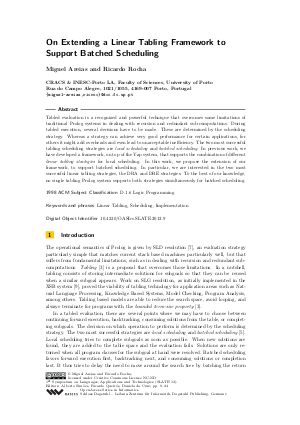On Extending a Linear Tabling Framework to Support Batched Scheduling
Authors Miguel Areias, Ricardo Rocha
-
Part of:
Volume:
1st Symposium on Languages, Applications and Technologies (SLATE 2012)
Part of: Series: Open Access Series in Informatics (OASIcs)
Part of: Conference: Symposium on Languages, Applications and Technologies (SLATE) - License:
 Creative Commons Attribution-NonCommercial-NoDerivs 3.0 Unported license
Creative Commons Attribution-NonCommercial-NoDerivs 3.0 Unported license
- Publication Date: 2012-06-21
File

PDF
OASIcs.SLATE.2012.9.pdf
- Filesize: 398 kB
- 16 pages
Document Identifiers
Subject Classification
Keywords
- Linear Tabling
- Scheduling
- Implementation
Metrics
- Access Statistics
-
Total Accesses (updated on a weekly basis)
0PDF Downloads0Metadata Views
Abstract
Tabled evaluation is a recognized and powerful technique that overcomes some limitations of traditional Prolog systems in dealing with recursion and redundant sub-computations. During tabled execution, several decisions have to be made. These are determined by the scheduling strategy. Whereas a strategy can achieve very good performance for certain applications, for others it might add overheads and even lead to unacceptable inefficiency. The two most successful tabling scheduling strategies are local scheduling and batched scheduling. In previous work, we have developed a framework, on top of the Yap system, that supports the combination of different linear tabling strategies for local scheduling. In this work, we propose the extension of our framework, to support batched scheduling. In particular, we are interested in the two most successful linear tabling strategies, the DRA and DRE strategies. To the best of our knowledge, no single tabling Prolog system supports both strategies simultaneously for batched scheduling.
Cite As Get BibTex
Miguel Areias and Ricardo Rocha. On Extending a Linear Tabling Framework to Support Batched Scheduling. In 1st Symposium on Languages, Applications and Technologies. Open Access Series in Informatics (OASIcs), Volume 21, pp. 9-24, Schloss Dagstuhl – Leibniz-Zentrum für Informatik (2012)
https://doi.org/10.4230/OASIcs.SLATE.2012.9
BibTex
@InProceedings{areias_et_al:OASIcs.SLATE.2012.9,
author = {Areias, Miguel and Rocha, Ricardo},
title = {{On Extending a Linear Tabling Framework to Support Batched Scheduling}},
booktitle = {1st Symposium on Languages, Applications and Technologies},
pages = {9--24},
series = {Open Access Series in Informatics (OASIcs)},
ISBN = {978-3-939897-40-8},
ISSN = {2190-6807},
year = {2012},
volume = {21},
editor = {Sim\~{o}es, Alberto and Queir\'{o}s, Ricardo and da Cruz, Daniela},
publisher = {Schloss Dagstuhl -- Leibniz-Zentrum f{\"u}r Informatik},
address = {Dagstuhl, Germany},
URL = {https://drops.dagstuhl.de/entities/document/10.4230/OASIcs.SLATE.2012.9},
URN = {urn:nbn:de:0030-drops-35113},
doi = {10.4230/OASIcs.SLATE.2012.9},
annote = {Keywords: Linear Tabling, Scheduling, Implementation}
}
